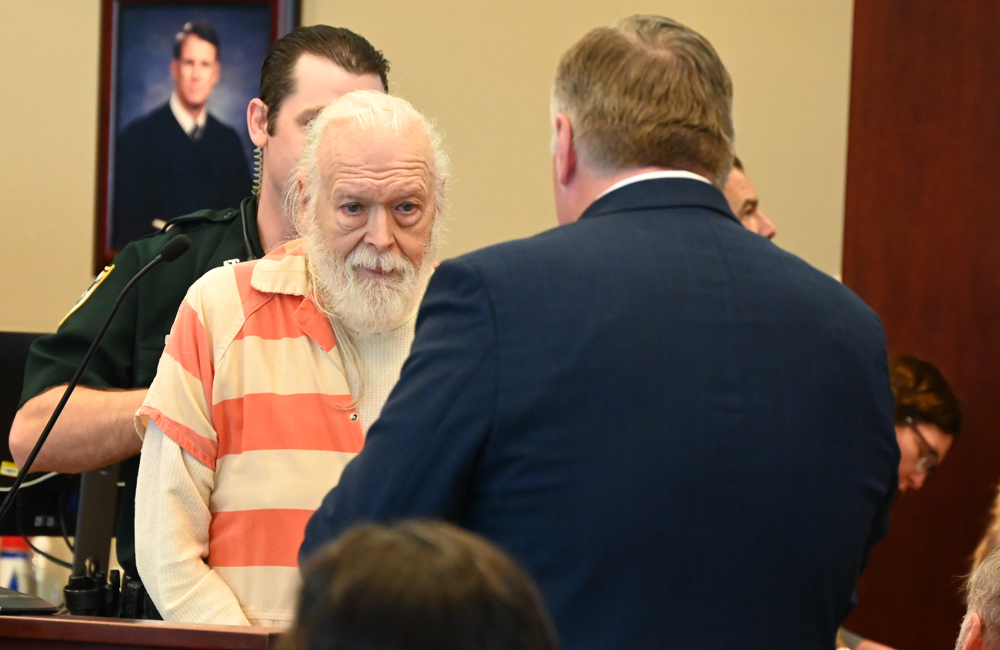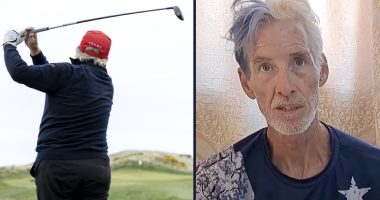
Circuity Judge Terence Perkins today ordered a neuropsychological evaluation of Charles Kidd Jr., the 85-year-old former resident of Blare Drive in Palm Coast’s Woodlands accused of murdering 36-year-old Mark Ruschmeier in August.
Ruschmeier and his mother Brigitte Ruschmeier were living with Kidd at the house at 20 Blare Drive at the time. Kidd faces a second-degree murder charge, which carries a minimum mandatory sentence of 25 years on conviction. He has pleaded not guilty.
In mid-October Assistant Public Defender Larry Avallone filed a “suggestion of incompetency” after Kidd was evaluated by Dr. Tracey Henley, a neuropsychologist, receiving a written report on Oct. 13 that “indicated that [Kidd] was incompetent to proceed.
Assistant State Attorney Jennifer Dunton, who is prosecuting the case, today asked for a court-ordered second evaluation. Perkins, at her suggestion, appointed Dr. Jason Demery of Gainesville, who will be new to this court.
Avallone initially objected to the state’s choice, claiming Dunton had already consulted with Demery. Reading from emails forming the substance of her contact with Demere, Dunton told the judge that the exchanges were exclusively about whether the neuropsychologist could be available. “I shared zero facts about this case,” Dunton said, other than the case number. Avallon conceded.
Kidd was in court today. He’s been held at the county jail on no bond, and his attorney has not motioned for a bond hearing to perhaps set a bond that Kidd could post. Kidd stood alongside Avallon at the lectern in front of the judge.
“Mr Kidd, do you understand what we’re talking about?” Perkins, his voice rising a few decibels from how he’d been addressing the attorneys, asked him.
“Yes, sir,” Kidd said without hesitating.
The judge explained the appointment of the neuropsychologist, and that Kidd would have to sit through an evaluation.
Read Related Also: Brian Laundrie: Lawyer Fights to Block Court from Seeing Killer’s Private Conversations with Parents
“Do you have any problem talking to them when they come?” Perkins asked.
“No, sir.”
The evaluation already conducted suggests Kidd is suffering from a “neurocognitive disorder,” according to the defense. That’s the medical term for dementia, which is often–but not always accurately–equated with Alzheimer’s. Dementia impairs memory, judgment and perspective, though there is a broad range in the way it presents and evolves.
Both Brigitte Ruschmeier and Kidd called 911 after the shooting, and deputies arrived there not long after it. Kidd followed all commands, surrendering to deputies. He remembered being in a physical fight with Mark but told deputies he couldn’t recall what about or where he’d put the gun afterward. He did remember shooting Mark–and that Mark was unarmed the whole time.
Should the case go to trial, the prosecution’s main witness would be Brigitte, who reached for her phone to call 911 when the two men were struggling–she’d heard her son telling Kidd to get off him as they wrestled in the bathroom–but she heard two gunshots before she dialed, then saw Kidd walk within view of her and tell her: “He got what he deserved.”
If the second neuropsychologist were to agree with the first, Kidd would be committed to a state hospital, but the hospital would be required to attempt to restore him to competency. Absent a plea, the aim is always to try the case. With dementia, that goal is more uncertain. If the two evaluations disagree, it will be up to Perkins to decide which way to go.
The next pre-trial in the case is scheduled for Jan. 24. The results of the competency evaluation are expected beforehand, and could prompt a hearing to decide next steps.
Days after Kidd’s incarceration, the Blare Drive house was again a police scene after a resident still living there was alarmed by a crate full of what was reported to be grenades. After a tense afternoon and a bomb squad investigating, the crate proved to have contained ammunition, but not grenades. Kidd had spent a career in the Coast Guard.









